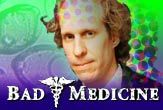FDA's New Label Law Won't Stop Fraudulent Dietary Supplements

The Food and Drug Administration wants to weed out the bad herbal and dietary supplement makers from the good, requiring that their products contain what the labels say they contain, just on the remote chance it might be important to consumers relying on these products for their health.
On June 22, the FDA established a new rule to ensure "that dietary supplements are produced in a quality manner, do not contain contaminants or impurities, and are accurately labeled," according to the official FDA announcement.
Boy, next thing the FDA will want is for these products to do what the labels claim they do. Where does the FDA get off ordering people around? Oh, right, Congress gave it the power more than a decade ago to set manufacturing standards for dietary supplements with the passing of the Dietary Supplement and Health Act of 1994. And here we are in 2007. How time flies when you're not regulating.
What's in this stuff, anyway?
The new rule, which many health experts say is too little too late, is certainly a step in the right direction. Buying quality dietary supplements, particularly from fly-by-night companies over the Internet, is often a crapshoot.
No other type of product that the FDA regulates is like this. Orange juice that claims to contain 100 percent juice contains 100 percent juice nearly 100 percent of the time. A bottle of 500-milligram aspirin tablets contain tablets with, lo and beyond, 500 milligrams of aspirin. Even a small, local iced tea maker must abide by strict regulations.
Not so in the world of dietary supplements, where a truth-in-labeling rule would require many manufacturers to change a label stating "vitamin E, 15 milligrams" or "chondroitin, 1,200 milligrams" to read "vitamin E, maybe" and "chondroitin, yeah right, on a good day."
Sign up for the Live Science daily newsletter now
Get the world’s most fascinating discoveries delivered straight to your inbox.
Scroll down the headlines at ConsumerLab.com, an independent laboratory that tests nutritional products, and the dire situation becomes quite evident. This week's top announcements were: "Most Milk Thistle Supplements Fail Tests," "Key Ingredients Missing in Many Arthritis Supplements," and "Problems Found with Twelve Multivitamins."
Please regulate us
Reputable companies such as Nature's Way Products welcome the new FDA rule as a means of lending credibility to the science of herbal medicine. There is nothing fraudulent about the notion that natural products can help the body heal. At least a quarter of the pharmaceuticals sold in the United States are derived directly from plants. Aspirin is a synthetic version of a compound found in willow tree bark. Milk thistle is the primary medicine for death-cap mushroom poisoning.
Unfortunately, much of the herbal and dietary supplement industries are far removed from the science of pharmacology. Accurate labeling and quality control should be merely an entry-level requirement. The real question asked by the consumer should be "does it work," not "I wonder how much of this label is fiction?"
Pharmacology is about dose and effectiveness, actually testing the medicine to see what is the effective dose. Few dietary supplements have been put through rigorous testing, and the results have been mixed. Echinacea, for example, just doesn't seem to be very effective in warding off colds; comfrey and kava kava can be downright deadly is used inappropriately. So, after this cumbersome requirement of proper labeling, the next appropriate step would be to regulate herbals like drugs, as is the case in Germany.
Stick to name brands
The new FDA rules are weakest against the main offenders, the small vendors with one or two employees, mixing a batch of wholesale ingredients in their garage next to a rusting Plymouth Duster and a stash of Jimmy Buffett albums. They sell those kinds of over-hyped products with ridiculous high-energy names with words like "turbo" and "max" and, for good measure, "turbo max."
Companies with more that 500 employees have to comply with the FDA rules by June 2008. Most of them already do. Small companies with less than 20 employees are off the hook until 2010. Yet is really doesn't matter: If these companies get caught, they'll just fold up shop, change names, and open again.
Often I root for the little guy. But with dietary supplements, many small companies simply don't know how to manufacture a consistent product. Many herbalists believe in and understand their products; too many others, though, are just in it for the money.
Christopher Wanjek is the author of the books “Bad Medicine” and “Food At Work.” Got a question about Bad Medicine? Email Wanjek. If it’s really bad, he just might answer it in a future column. Bad Medicine appears each Tuesday on LiveScience.
- Dietary Supplements: Too Much of a Good Thing?
- Video: Aspirin and Sex Drive
- Top 10 Aphrodisiacs

Christopher Wanjek is a Live Science contributor and a health and science writer. He is the author of three science books: Spacefarers (2020), Food at Work (2005) and Bad Medicine (2003). His "Food at Work" book and project, concerning workers' health, safety and productivity, was commissioned by the U.N.'s International Labor Organization. For Live Science, Christopher covers public health, nutrition and biology, and he has written extensively for The Washington Post and Sky & Telescope among others, as well as for the NASA Goddard Space Flight Center, where he was a senior writer. Christopher holds a Master of Health degree from Harvard School of Public Health and a degree in journalism from Temple University.











